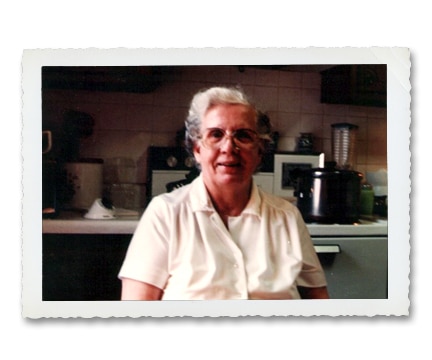In the pantheon of mothers-in-law, my mother-in-law, Almina Irali Francese, is the brightest shining star. Briefly, here is her story. Almina Maria Giuseppina Irali was born on January 21, 1908 in Cozzanello di Monchio, Parma, Italy. She was the second oldest of twelve children. She and her parents emigrated to the United States when Almina was a toddler, eventually settling in Readsboro, Vermont, just north of the Massachusetts border.
After working in Pittsburgh as a dynamiter, Almina’s father, Antimio, moved the family to Vermont where he purchased a small plot of land and took a job as a fireman on the railroad. Her mother, Francesca, had her hands full raising twelve children and relied on Almina and the older children to help out. This was a rugged, backwoods type of existence. Food for this large family was provided by a home garden, and hunting in the woods around Readsboro provided whatever meat they consumed. Almina attended a one-room school house until she was sixteen, completing the 9th grade. She then moved to Pittsfield, Massachusetts to take a job at the General Electric plant, and her formal education came to a halt. She soon met her husband and started a family. She and her husband, Peter, lived the rest of their lives in Pittsfield and raised five children. My husband, Peter, was the second youngest.
Almina was 53 years old when I first met her in 1961. My own mother had died when I was 17. Almina soon became a sort of surrogate mother. She took me under her wing and filled the gaps in my knowledge of how to cook, how to be a mother to my own children, and, most importantly, how to view life through a prism of laughter laced with a strong dose of practicality. She was nothing short of amazing. At 43, she went to night school to complete her high school diploma. She was highly intelligent and read prodigiously. In her later years she took painting lessons. Many of her paintings hang in the homes of her children and grandchildren. Her beautiful handcrafted hooked and braided rugs warm the interiors of those same homes. When she was in her 80s, she could beat anyone at a game of Scrabble.

Meals at her table were delicious. She prepared simple dishes, always using the freshest ingredients. Her roasted chickens were spectacular. When we asked for instructions on how to cook them her way, her answer was simply, “You just put it in the oven!” Cooking was second nature for her. She was far ahead of her time in cautioning anyone who would listen to avoid “chemicals” in processed food. I recall that she was horrified when she discovered that I was feeding our children hot dogs. If she were alive today, she would revel in the farm-to-table movement.
Almina’s antipasto was a family favorite. Making this pickled vegetable mélange was the highlight of the summer growing season. She and her friend Anita Oppedi would set aside several days totally devoted to making dozens of jars of antipasto. When our young family would visit, we hoped that there were a couple of jars left, some to enjoy during our visit, and of course, one or two to take home with us.
When I asked Almina for her treasured recipe, her instructions were almost as vague as her recipe for roast chicken. She was delighted to tell me how to make it, but her written directions consisted of “a soup plate of this” and a “tea cup of that.” Over the years, I’ve refined her notes into a coherent recipe. I don’t make antipasto often enough to satisfy my husband, but when I do, I’m proud to say that I’ve been able to duplicate my wonderful mother-in-law’s signature dish. Almina passed away in 1995, but her spirit joins us every time we open a jar of her antipasto and savor each mouthful. I hope you’ll give it a try. The effort will be worth it. Buon appetito! ![]()
